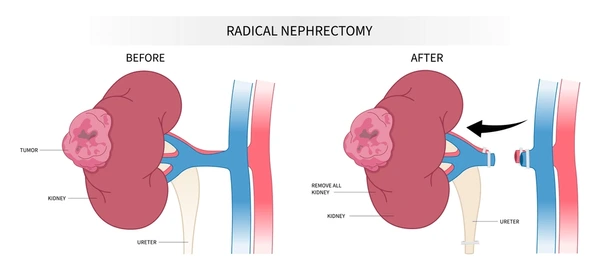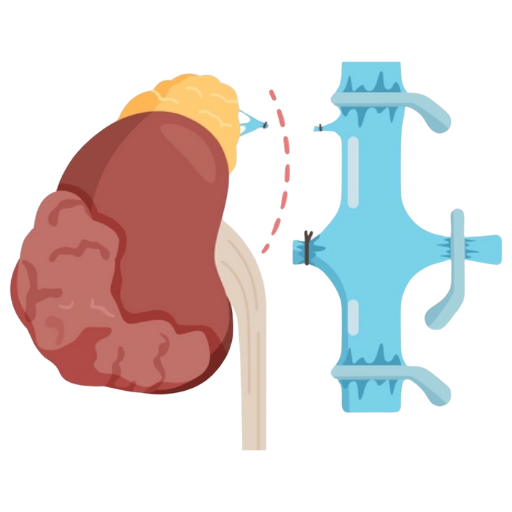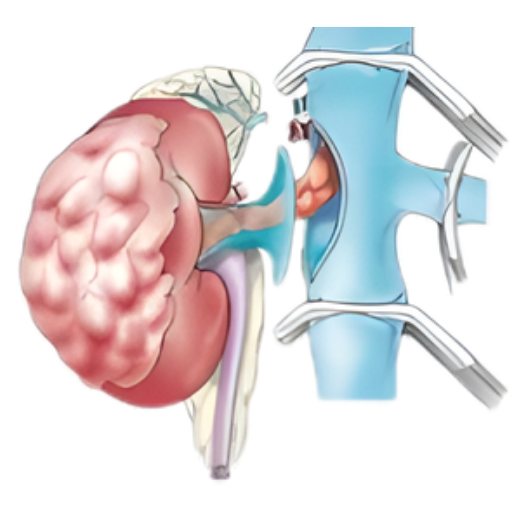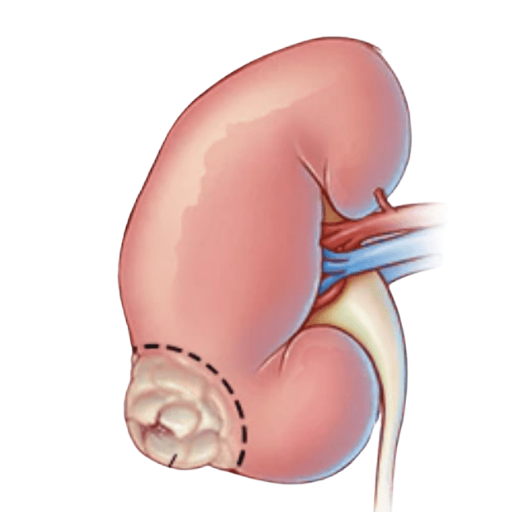Dr. Nitin Singhal
Radical Nephrectomy
What is Radical Nephrectomy?
Radical nephrectomy is a major surgical procedure in which the entire kidney is removed along with surrounding tissues such as the adrenal gland, nearby lymph nodes, and sometimes surrounding fat. It is primarily performed to treat kidney cancer, especially when the tumour is large, centrally located, or cannot be safely removed with a partial nephrectomy. The goal of this surgery is to completely remove the tumour and reduce the risk of cancer spreading to other parts of the body.
The surgery can be done through open surgery or minimally invasive methods such as laparoscopic or robotic-assisted techniques, depending on the patient’s health and tumour characteristics. Recovery usually involves a hospital stay of several days, followed by a few weeks of rest before resuming normal activities. Radical nephrectomy is a definitive treatment for kidney cancer, but patients are monitored long-term for kidney function and potential recurrence.

Happy Clients
Successful Surgeries
Patients Reviews Rate
Years of Experience
Types of Radical Nephrectomy Surgery

Open Radical Nephrectomy
A large incision is made in the abdomen or side to remove the kidney. Best for large or complex tumours needing direct access.

Laparoscopic Radical Nephrectomy
Small keyhole incisions with a camera are used to remove the kidney. Leads to less pain, faster recovery, and smaller scars.

Robotic-Assisted Radical Nephrectomy
A robotic system helps the surgeon with precision and flexibility. Ideal for complex cases with fewer complications.

Hand-Assisted Laparoscopic Radical Nephrectomy
Your Guide to Radical Nephrectomy
Radical nephrectomy is generally safe, but like any major surgery, it carries certain risks. These may include bleeding, infection, blood clots, or injury to nearby organs such as the spleen, pancreas, or intestines. Since one kidney is removed, there may also be a long-term impact on overall kidney function.
Other risks can depend on a patient’s age, overall health, and medical conditions such as diabetes, high blood pressure, or pre-existing kidney disease. Patients with only one functioning kidney after surgery need regular follow-ups to monitor how well their remaining kidney is working.
Immediately after surgery, patients may experience pain, swelling, fatigue, and difficulty in movement around the incision site. Some may also notice temporary digestive issues, reduced appetite, or mild changes in urination.
Long-term, most patients adjust well, but some can develop high blood pressure or reduced kidney function over time. Regular monitoring of kidney health and lifestyle adjustments, such as proper hydration and a balanced diet, help in managing these changes.
Treatment mainly focuses on recovery and supportive care after surgery. Pain management, antibiotics to prevent infection, and blood thinners to reduce clot risks are usually provided in the hospital. Patients are encouraged to walk early to improve circulation and healing.
In the long run, oncology follow-ups, blood tests, and imaging scans are done to monitor for cancer recurrence or kidney function issues. If needed, lifestyle changes such as quitting smoking, controlling blood pressure, and maintaining a kidney-friendly diet become part of ongoing care.
Why Choose Dr Nitin Singhal For Radical Nephrectomy Cancer Surgery?
Dr. Nitin Singhal, a leading Radical Nephrectomy Cancer, has 15+ years of experience with over 5,000 successful major cancer surgeries. He specializes in a wide range of procedures including GI, thoracic, gynecologic, urologic, and kidney cancers with a focus on precision and safety.

Expertise
With vast experience in complex kidney tumours, Dr Nitin Singhal performs Radical Nephrectomy that is both oncologically safe and minimally invasive. He balances complete cancer removal with kidney preservation strategies for better long-term outcomes.
Infrastructure
Patients benefit from world-class robotic systems, advanced ICUs, and modern OT facilities under his care. This ensures safer surgeries, reduced hospital stays, and seamless collaboration among specialists for comprehensive treatment.
Technology
Dr Nitin Singhal uses robotic-assisted and minimally invasive techniques for precise tumour removal. His approach reduces blood loss, speeds recovery, and preserves kidney function while offering personalised, compassionate care.
Benefits of Radical Nephrectomy Surgery?

Faster Recovery Time

Low Risk of Infection

Lesser Scars

Less Discomfort After Surgery

Shorter Hospital Stay

Speedier Return to Daily Life
Commonly Asked Questions
What is the recovery time for a radical nephrectomy?
Recovery from a radical nephrectomy usually takes 4 to 6 weeks, depending on the patient’s overall health and the surgical approach used. Minimally invasive (laparoscopic or robotic) surgery often allows faster recovery compared to open surgery. Most patients can return to light activities in 2–3 weeks but need more time for full recovery. Regular follow-ups are important to monitor kidney function and healing.
Is radical nephrectomy major surgery?
Yes, radical nephrectomy is considered a major surgery because it involves removing the entire kidney, and sometimes nearby tissues or lymph nodes. It requires general anesthesia, hospital stay, and a significant recovery period. As with any major surgery, there are potential risks such as bleeding, infection, or reduced kidney function. However, in experienced hands, it is generally safe and effective.
Where is the first place kidney cancer spreads to?
Kidney cancer most commonly spreads first to the lungs, followed by nearby lymph nodes, bones, or the liver. This spread occurs when cancer cells break away from the kidney and travel through the bloodstream or lymphatic system. Early detection and treatment are crucial to prevent or limit metastasis. Regular imaging and monitoring after surgery help track any signs of spread.
What is the most successful treatment for kidney cancer?
The most effective treatment for kidney cancer is surgery, either partial or radical nephrectomy, depending on the tumor’s size and location. For localized cancers, surgery often provides the best chance of cure. In advanced or metastatic cases, targeted therapies and immunotherapy are combined with surgery for better outcomes. The choice of treatment depends on the stage, patient’s health, and overall kidney function.
Get In Touch!
We provide a 24*7 emergency care
If you have any kind of robotic cancer surgery-related medical emergency, visit Sterling Hospital. An expert doctor is always available & treatment will be provided at once.
